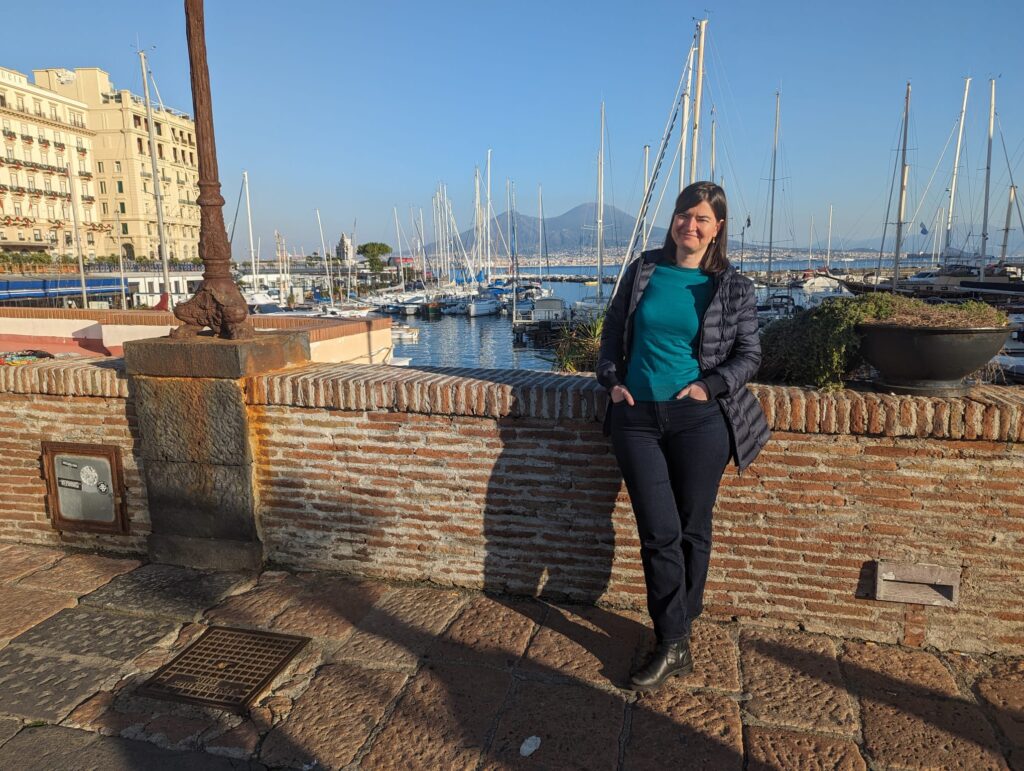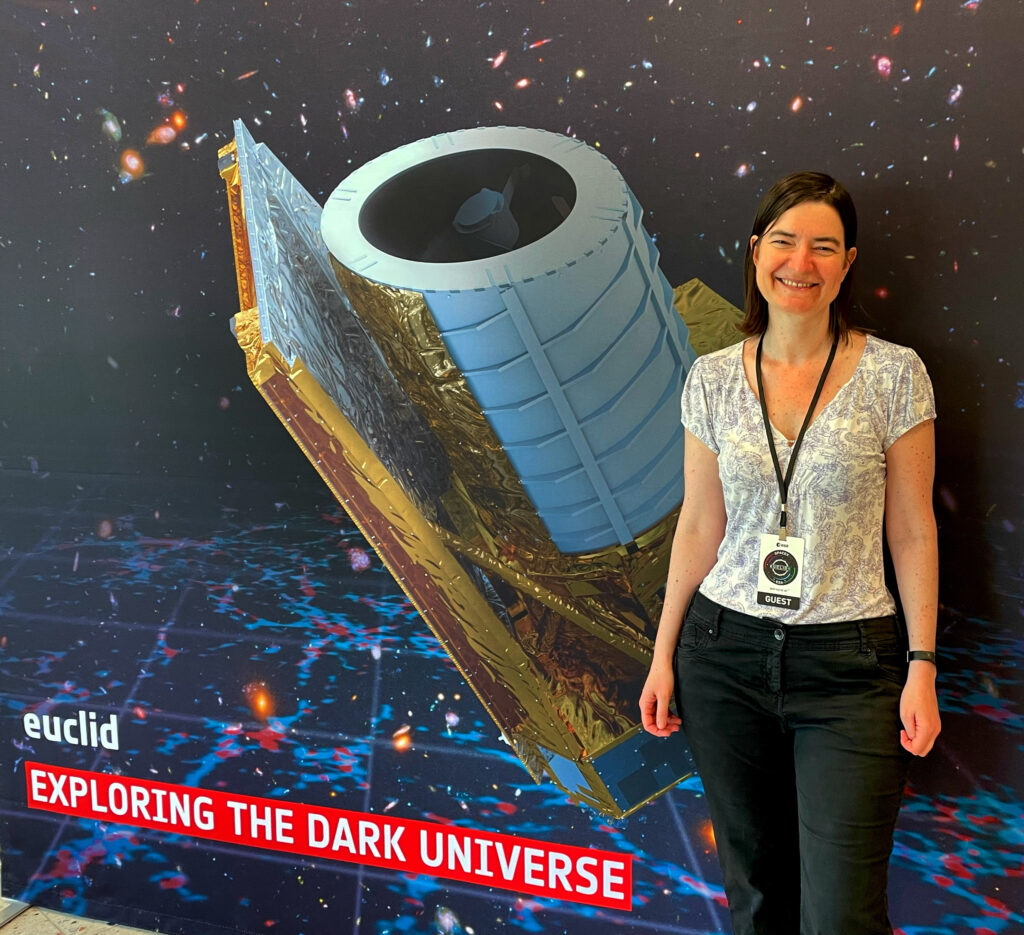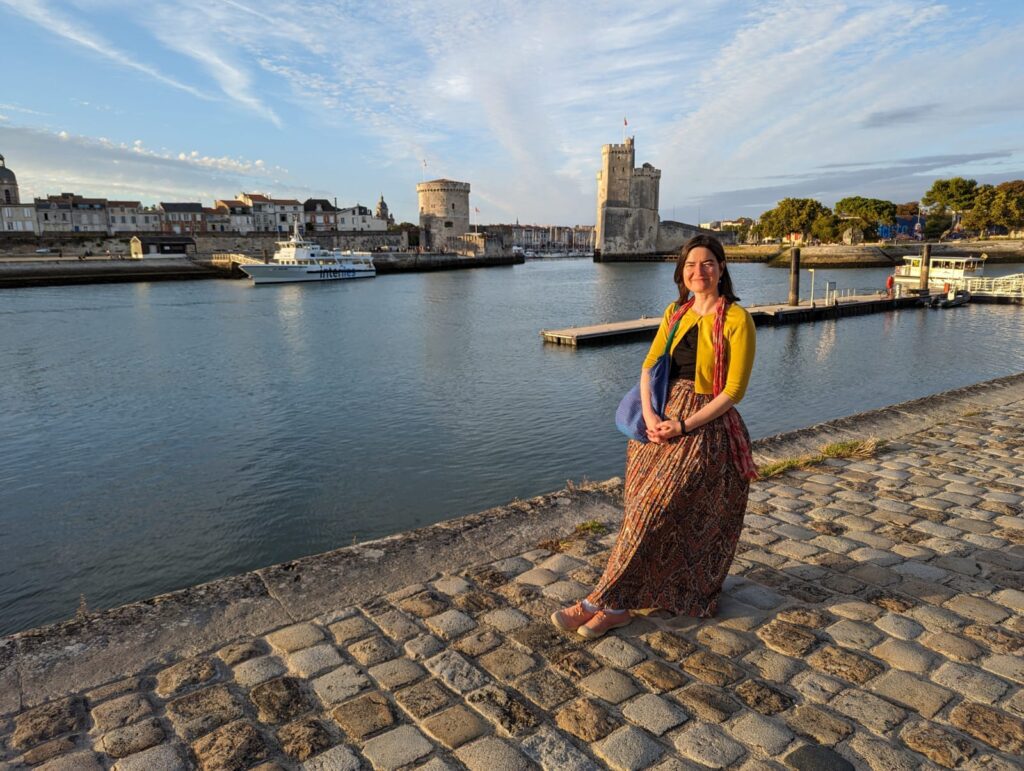Euclid is a space mission planned, built, and operated by more than 2000 scientists and engineers across Europe and other countries. In Portraits of Euclideans we showcase the people behind the mission.
In this portrait: Valeria Pettorino, ESA Euclid Project Scientist

- Can you tell us something about your background and the place you grew up in?
I was born in Naples, Italy, a city where beauty and chaos mix in everything you see. The amazing landscapes on the coast, driving to Sorrento, facing an active volcano; the tasty food, with very specific settings and ingredients; the disorder; the shouting. Naples was a gift and a curse: a pleasure that biassed my taste for years to follow; yet a place where nothing was trivial: getting anything done required a lot of effort. It’s a city where people try to emerge with their energy, creativity, solidarity towards others, resignation: they have to fight for things that should be given rights. It is a place where I felt joy and fear. At that time, I didn’t appreciate yet how nice it is to be in a warm place by the sea.
I studied in Naples; during high school I did an exchange program in Cambridge, Ontario, Canada; later, at university, I did the ERASMUS exchange program in Grenoble, France. I moved about 10 times in 12 years: after my PhD, in 2005, I worked in Valencia (Spain), Torino, Trieste (Italy), Heidelberg (Germany), New York (USA), Geneva (Switzerland), back to Heidelberg as Research Group Leader. I got a permanent position at CEA Paris-Saclay (France) in 2016. In November 2023 I started to work for ESA at ESTEC in the Netherlands as Euclid Project Scientist.
- What is your role in the Euclid consortium?
I joined the Euclid Consortium from the start, in 2007 (former DUNE), and I contributed to different teams, as a scientist, and as a project manager. I was very much involved in the Theory Science Working Group (also as deputy lead). I led a team in charge of forecasting Euclid performance on different theories of the Universe. Later on, I led the Inter Science Taskforce on Likelihood, a team at the interface across different science working groups. Over the years I also volunteered for service tasks related to the organisation of such a large Consortium: Early Career Committee, Builder Committee, Communication, Euclid Prize Committee.
Starting November 2023 I joined ESA, and I can now look at Euclid from a different perspective: I follow day-by-day the activity of the Science Operations Centre (SOC) at ESAC near Madrid, a team of engineers and scientists who dedicate an enormous effort to plan Euclid scientific observations. Together with the Mission Operation Centre (MOC) at ESOC in Darmstadt, Germany, they make sure that the satellite operates correctly. In my new role, I need to interface with the scientific community at large, maximise the scientific return from the mission within given constraints, explore synergies with data centres around the world and investigate solutions that will help the transfer and usage of a large amount of data, supporting the ESA Euclid Mission Manager in all aspects which are related to Euclid science.
- What is the most interesting or exciting thing about your job?
Cosmology is reassuring. It gives perspective. When I think about physics at large scales, my local human problems feel negligible. I value the chance to know many different people with widely differing expertise, who I encountered along the way over many years: I like when they manage to act together to allow a very complex piece of technology to work and reach its objectives. I am at my best when I can help people with complementary skills to interact and work together.
- What excites/interests you most about Euclid?
The idea that human beings can do great things when they collaborate as a community; valuing each other’s complementary expertise allows them to do things that one would never be able to do as individuals.
And Dark Energy.

- Can you tell us a bit about the work and the goals of the Theory Science Working Group in Euclid?
The Theory Science Working Group identifies which theoretical models can be tested with Euclid. This involves designing new theories, calculating the equations which allow us to describe them mathematically, developing software that estimates predictions of physical observables within these theories.
- What are the key differences between the cosmological models that can be explored with Euclid compared to the current concordance model?
Different cosmological theories have a different impact on the expansion of the Universe and on the growth of structures in it. Whether dark energy is constant or evolving in time and space, whether gravity is as we know it from General Relativity or modified at large scales, is modelled via a variety of parameters: different parameters correspond to subtle differences within the whole cosmic web and its evolution. They can lead to a different number of clusters, different mean sizes of voids, and to structures forming earlier or later in the evolution of the Universe. The way we model dark energy, gravity, and forces at large scales changes our predictions for the physical quantities we observe.
- What were your biggest challenges?
Living with a fixed-term contract for 12 years was a challenge. As much as I was motivated to travel, it was not easy to move so many times, restarting everything in a new setting, in a new country, sometimes with a different language, far from my family. Space missions last for many years, with a timeline that is much longer than our typical life events. And while moving, it was a challenge to keep or increase my responsibilities, access roles of management and decision making. I felt that having worked in different countries was not always valued as much as it deserved.
Over the years it was also challenging to continuously apply for funding to finance my own job, and then the job of students and postdocs in my group. An enormous amount of time goes into applying.
Finally, for me the most challenging aspect is whenever I encountered lack of transparency in decisions and roles. For me transparency is essential to move forward as a community, to build trust, to gain legitimacy and to make people feel valued.

- What should you probably have learned sooner?
I did my best to learn as much as I could, proactively taking training on management, communication, science diplomacy, data science, and all the skills which I felt were needed to fulfil my role. I am OK with what I learned and when I learned it, and also with what I didn’t learn yet. We can’t do everything.
- Any advice for an aspiring scientist?
I would advise talking to a diverse group of people who have followed that career path. This can be facilitated by joining online networks of researchers and international mentoring programs. Then make your own choices. Work hard but in a way which is compatible with being respectful of others and of what your own priorities are.
- What is your ultimate goal as a scientist?
To increase collective knowledge about the Universe. I think that good scientists value and respect others, listen, potentially make mistakes, apologise whenever necessary, and study when they don’t know something. They make an effort to be transparent in the methodology they use, in the decisions they take, in the choices made in the data analysis.
- What do you do for fun?
I learned to like whatever the city I lived in had to offer: over the years I did tango, lindy-hop, acting, creative writing, skiing, tennis, and running.
At present I volunteer for different initiatives. They remind me that there are many interesting things and people in life, with different competences, challenges and passions.
Since 2020 I have been board member and vice-president of DIRE, a network of Italian women in Paris, with different professions: with the board I co-organise events related to science, art, literature, society, music, sport. DIRE aims, among other things, to enhance the role of women, encourage professional and personal exchanges between members, in collaboration with other professional associations. I have been a founding mentor of the Supernova Foundation since 2015: it’s a worldwide mentoring and networking programme for women in physics, led by Michelle Lochner and by a fantastic group of colleagues. In 2023 I also volunteered as a mentor for Space4Women, an initiative of the United Nations Office for Outer Space Affairs to promote the benefits of space and STEM careers to encourage women and girls to pursue these fields.


